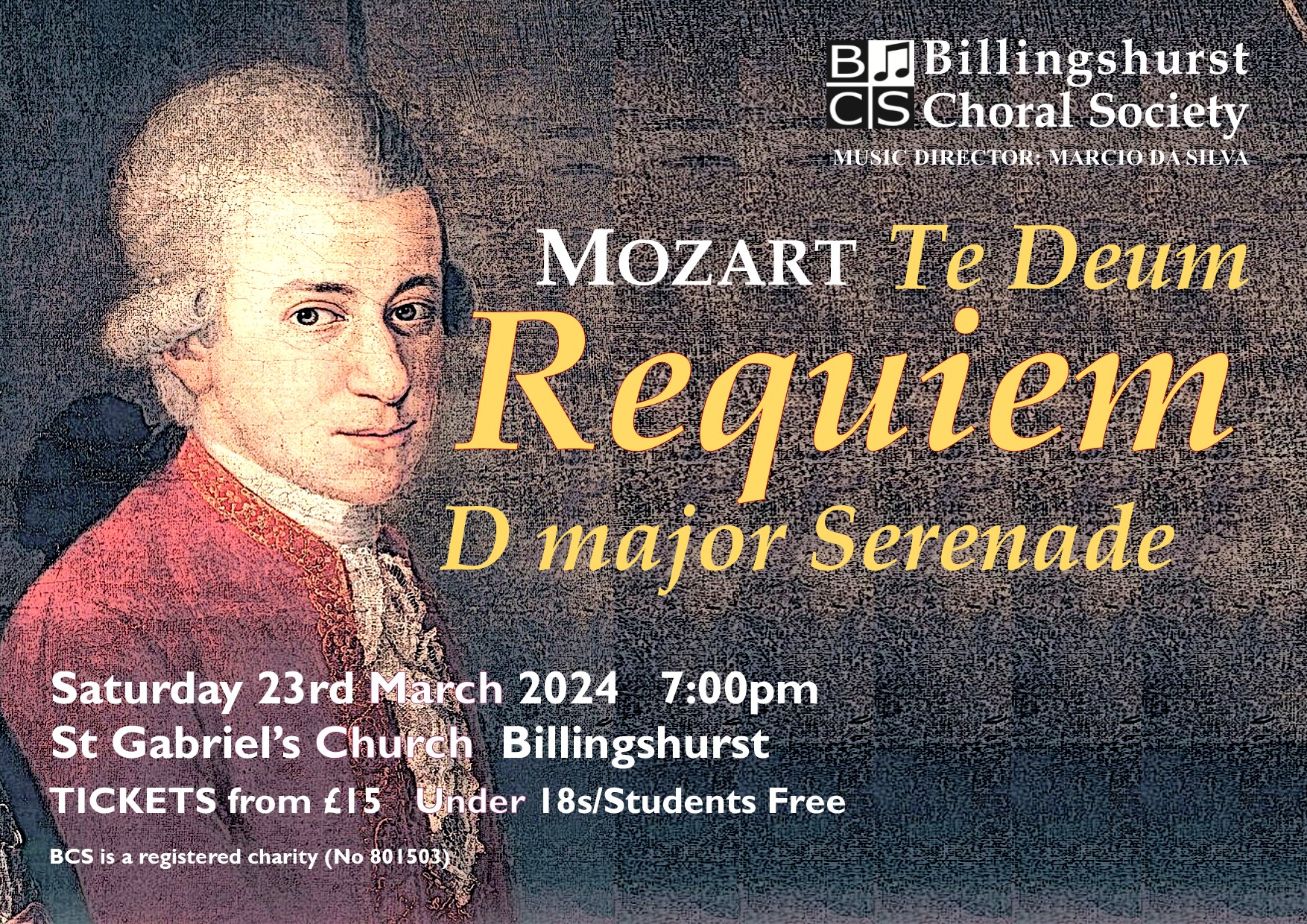
A Review of Billingshurst Choral Society's performance of Mozart’s Requiem
Saturday 23rd March 2024
It is true to say that each music-lover has their requiem of choice. The operatic enthusiasts will share in their mourning under Verdi’s; the loving souls will feel lulled by the ethereal melodies of Brahms or Fauré, but nine out of ten music enthusiasts will prefer Mozart’s Requiem.
St. Gabriel’s Church was a fitting venue for this performance by the Billingshurst Choral Society (BCS) under the precise and passionate baton of Brazilian-born maestro Marcio da Silva, the choir’s Music Director. There were four outstanding soloists and the wonderful Hastings Philharmonic Orchestra completed the line-up. With a sombre theme appropriate for Eastertide, the bulk of the programme was the Requiem, but two pieces, Te Deum and D Major Serenade lightened the atmosphere in first half of this sell-out concert.
The opening eight bars of the Requiem’s Introit set the scene and suggested a funeral procession, with the strings sounding like footsteps. The choir then made a dramatic entrance with great light and shade as it sang Requiem aeternam dona eis, Domine. The Kyrie was masterful and dynamic; da Silva kept the choir and the orchestra in perfect synchronicity throughout and the sound was truly impressive taken at full speed.
The Dies Irae was forceful and full of energy, the choir responding immediately to da Silva’s commands, rhythmically and emotionally in its reply at all times. A change in tempo heralded the start of the Tuba Mirum with the wonderful sound of the trombone at the start of this soloist quartet. The rich voice of the bass, Jay Rockwell, reverberated in answer to the trombone; his deep tones were focused and the quality of his phrasing was superb. John Twitchen’s voice was an amalgam of a lyric tenor with subtle spinto overtones, giving a certain Mozartian style of performance, reminiscent of the operatic sound. Lydia Ward’s Mezzo voice was extremely beautiful showing a depth of expression, especially in the core of her musical phrases. Helen May’s incredibly powerful voice demonstrated a warmth and rich tone which blended perfectly with the other fine soloists. It is interesting to note that when dealing with the soloists, da Silva achieved an excellent balance between their voices and the orchestra: the sign of a truly experienced conductor who listens to his professionals and provides the glue that keeps them perfectly together in both sound quality and intensity.
The Rex Tremendae had a great depth of sound and there was a real sense of majesty in the music. The choir and orchestra were completely together throughout the piece, which was evident from the very start with the first ‘Rex’ and then silence.
Da Silva made sure that there was ample bite and weight to the Confutatis with strong entries from the basses followed by the tenors, who were all spot-on with their pitch and timings.
I liked the nimble approach to the Offertorium and the heavier, more strict overtones of the Quam olim Abrahae fugue at the end of that movement, which was pleasingly lively. The choir must be congratulated in responding as it did to da Silva’s instructions, without excessive gestures, allowing the audience to focus fully on the wonderful music. It demonstrated a thorough understanding of the operatic style and I was most impressed by the choir’s attention to dynamics.
The Lacrimosa was sung with a spine-chilling depth of feeling. Of course, Mozart composed only six bars before passing away on 5th December 1791 at the age of 35 and it was left to his most able pupil, Franz Süssmayr to complete. Moving on to the final two movements: the Lux Aeterna and Cum Sanctis Tuis demonstrated the tenacity and staying-power of the 78- strong voices of this dynamic choir. Keeping up the pressure right to the end, da Silva took these movements at full speed and both the singers and orchestra miraculously kept pace with their conductor. At such a pace, such rhythmic accuracy can only be achieved by a competent choir such as BCS.
Overall, the wonderful Requiem was performed precisely and enthusiastically by both singers and orchestra under the expert baton of da Silva. The standard would certainly have been most fitting for one of the major sacred music venues in London.
George Parnell
24.03.2024



